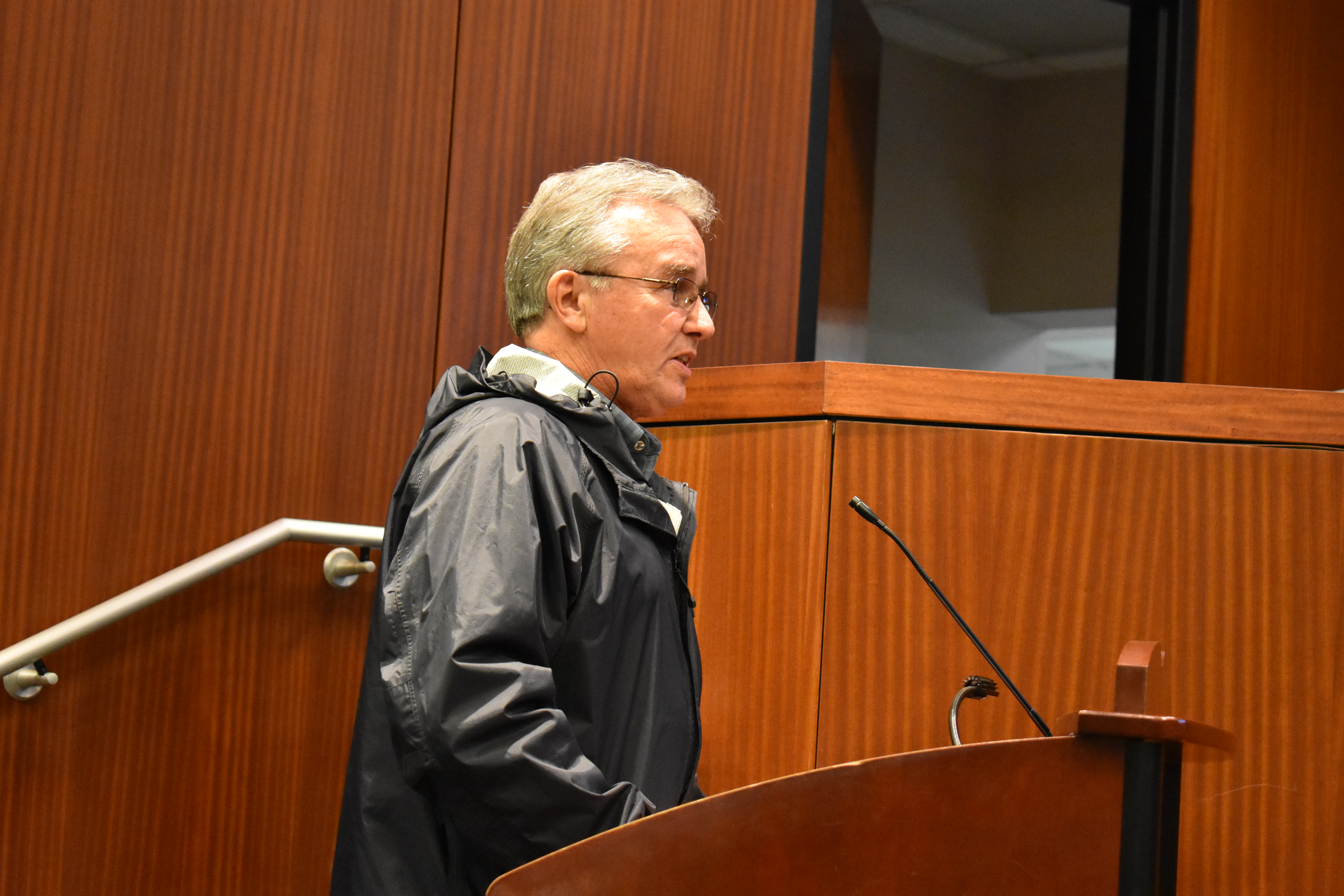Good Hope Mayor Jerry Bartlett talks to the Cullman City Council about an incentive plan to re-locate AGCOR Steel to Good Hope. The plan requires concessions from the City of Good Hope, the City of Cullman and Cullman County. / W.C. Mann
CULLMAN – Good Hope Mayor Jerry Bartlett addressed the Cullman City Council Monday night, requesting that it hold its “772” hearing regarding AGCOR Steel. As The Tribune first reported last week, AGCOR Steel is moving to Good Hope. The Good Hope City Council last Monday night passed a resolution allowing Bartlett to enter an agreement with the company. AGCOR, which will build on 53 acres on Industrial Drive, will be Good Hope’s first manufacturer. Bartlett said the company will add up to 20 new jobs and is expected to have annual sales of $8-$10 million.
AGCOR Steel chose to relocate in Good Hope from Vinemont, selecting the Cullman County municipality over Gadsden, and made that choice in part based on economic incentives proposed jointly by the City of Good Hope, Cullman County and the City of Cullman, each of which had to hold a public hearing and pass a resolution to move the project forward. The Cullman County Commission last Tuesday set its Amendment 772 hearing date for March 13 to approve the signing of the resolution.
Amendment 772 to the Alabama Constitution, which governs the use of public funds for economic development, reads as follows:
Promotion of Economic and Industrial Development by County Commission.
(a) The governing body of any county, and the governing body of any municipality located therein, for which a local constitutional amendment has not been adopted authorizing any of the following, shall have full and continuing power to do any of the following:
(1) Use public funds to purchase, lease, or otherwise acquire real property, buildings, plants, factories, facilities, machinery, and equipment of any kind, or to utilize the properties heretofore purchased or otherwise acquired, and improve and develop the properties for use as sites for industry of any kind or as industrial park projects, including, but not limited to, grading and the construction of roads, drainage, sewers, sewage and waste disposal systems, parking areas, and utilities to serve the sites or projects.
(2) Lease, sell, grant, exchange, or otherwise convey, on terms approved by the governing body of the county or the municipality, as applicable, all or any part of any real property, buildings, plants, factories, facilities, machinery, and equipment of any kind or industrial park project to any individual, firm, corporation, or other business entity, public or private, including any industrial development board or other public corporation or authority heretofore or hereafter created by the county or the municipality, for the purpose of constructing, developing, equipping, and operating industrial, commercial, research, or service facilities of any kind.
(3) Lend its credit to or grant public funds and things of value in aid of or to any individual, firm, corporation, or other business entity, public or private, for the purpose of promoting the economic and industrial development of the county or the municipality.
(4) Become indebted and issue bonds, warrants which may be payable from funds to be realized in future years, notes, or other obligations, or evidences of indebtedness to a principal amount not exceeding 50 percent of the assessed value of taxable property therein as determined for state taxation, in order to secure funds for the purchase, construction, lease, or acquisition of any of the property described in subdivision (1) or to be used in furtherance of any of the other powers or authorities granted in this amendment. The obligations or evidences of indebtedness may be issued upon the full faith and credit of the county or any municipality or may be limited as to the source of their payment.
According to Bartlett, Vinemont-based AGCOR hoped to remain in Cullman County, but had already chosen a site in Gadsden for relocation. The economic concession that helped along the decision-making process involved the three entities–the City of Good Hope, the City of Cullman and Cullman County–each giving back to AGCOR one half cent from each dollar the company pays to the County in sales taxes. Because of the county tax structure, all three receive portions of any sales tax money generated in the county. The total refund of $133,000 per entity will be paid out over the next eight years or until the company is reimbursed for the $400,000 it spent to purchase the property in Good Hope, whichever comes first. If company sales increase, the payoff will occur sooner.
Bartlett told the council, “We have passed our 772 hearing on the 26th, last Monday night, and the (Good Hope) Council went and passed a resolution authorizing myself to execute the economic development agreement with AGCOR. And I’m here tonight to personally ask you to move forward with your 772 hearing.”
Council President Garlan Gudger reported to the council that AGCOR’s new facility will allow the company to increase its workforce from 14 to 34, and the company predicts $8-$10 million in annual sales. Both Bartlett and Cullman Mayor Woody Jacobs wanted to be sure people understood that money being channeled back to AGCOR would not be lifted from any existing fund but drawn from the sales taxes paid by AGCOR itself.
Said Bartlett, “We’re only paying them back out of money that they’re producing. So, all of this is going to be new money that would have been going to the Gadsden area if we hadn’t kept them here.”
Under Amendment 772, in order to enact an expenditure of public funds to promote industry, a county or municipality must hold a public hearing beforehand and must advertise the hearing to the public for a certain time before that. The council set a public hearing on the City of Cullman’s part of the 772 project to take place during its meeting on March 26.
After the meeting, Bartlett told The Tribune, “This is the first time we’ve had a plant in the city of Good Hope. I like to brag about that, but I could not have done this without the City of Cullman, (Cullman Economic Development Agency’s) Dale Greer, and County Economic Development–Cherrie Haney, and the commissioners from Cullman County. It would not have happened without all of us.”
Other council business
The council heard from Fire Chief Edward Reinhardt that the new fire station on Alabama Highway 157 should open sometime next week. A definite date for a formal council visit and ribbon-cutting was not set.
The council set another public hearing, this one on April 9, 2018 for an ordinance to adopt the 2015 International Building Code including the companion codes. The updated code was recommended by both City Planning and Building Director Rick Fulmer and the City Planning Commission.
The council approved two requests:
- from Salim Virani of Five Points Store for a beer and wine off-premises alcohol license at 205 Rosemont Ave. NW, pending approval from the building department and fire department, both of which had indicated issues in the facility which needed to be addressed before they would sign off.
- from Waid Harbison of Cullman Parks and Recreation for a special event permit to hold the annual Strawberry Festival in Depot Park on May 5, 2018 from 7 a.m. until 7 p.m.
The council also approved an ordinance to annex 227 County Road 1403, owned by David and Christine Wiggins, into the city limits of Cullman as an R-1 Residential District. The council suspended procedural rules to pass the ordinance on its first reading, after the annexation received a favorable recommendation from the City Planning Commission at a meeting earlier in the evening.
Planning Commission
The City of Cullman Planning Commission met before the council meeting, giving a favorable recommendation to the annexation mentioned above, and approving the site plan for a new Cullman Power Board warehouse off Golf Course Road Southwest.
The commission also heard from Gary Scheetz, who lives on Leeman Drive near the Fox Meadow subdivision. Scheetz challenged the legality of building permits issued for the second phase of development in the subdivision, arguing that a promised public meeting did not take place before those permits were issued.
Building Director Rick Fulmer noted that he had agreed to a meeting before issuing permits, and apologized to Scheetz for the oversight, but countered that, since Fox Meadow is already a recorded subdivision, the one permit that has been issued is still valid, not necessarily requiring a meeting. Fulmer also addressed certain specific issues concerning the impact of Fox Meadow development on Scheetz’s property, and assured Scheetz that a public hearing will take place concerning those issues, possibly as early as the next planning commission meeting.
The planning commission meets on the first Monday of each month in the Cullman City Hall auditorium at 5:30 p.m. The Cullman City Council will meet next on Monday, March 26 in the Cullman City Hall auditorium at 7 p.m. The public is invited to attend each meeting.
Copyright 2018 Humble Roots, LLC. All Rights Reserved.



























